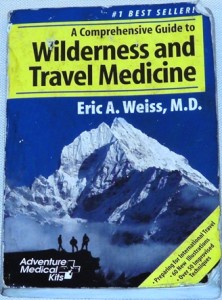
In preparation to take a Wilderness First Responder certification course I started thinking about Samaritans, not that I know any personally. When I looked them up in Wikipedia I was surprised to learn that as of Nov 2011 there were only 745 of them in the world, mostly near the cities of Nablus and Holon. I am sure as with any group there are good and bad ones, but I am mostly interested in the good Samaritans- the ones with the legal doctrine that is either going to encourage and protect me or set me up for complete and total financial ruin.
I started thinking about the golden rule:
Do unto other as you would have others do unto you
It sounded pretty good when I was thinking about others doing unto me things such as pulling me out from under an avalanche of snow, performing CPR to restart my pathetic little heart, or simply splinting my broken leg and carrying me out of the wilderness on a litter fit for a king. It seemed a little less compelling when I thought about others doing unto me things such as dragging me by the leg compounding a spinal injury, CPR-ing my ribs into my spleen, or dropping me down the face of a cliff, making litter of my litter.
Why is it that intent and impact can have such different outcomes?
Clearly there are attorneys who can only survive by feasting on yummy rich tortes. Fear of legal peril has put at risk our willingness to aid an injured fellow traveler. The theory of the good Samaritan doctrine is to encourage voluntary assistance by offering some degree of immunity from legal damages.
Good Samaritan laws vary by country and state. The trick is to craft Samaritan law in such a way to consider both intent and impact when a volunteer renders assistance. If judged only by impact, any mistake would leave the volunteer at great peril, so much so, many would simply choose not to act. By removing all risk, however, we might encourage the volunteer to engage in reckless and even wanton behavior. Balance is the key. As an example:
Any person who in good faith renders emergency care, without remuneration or expectation of remuneration, at the scene of an accident or emergency to the victim of the accident or emergency shall not be liable for any civil damages resulting from the persons acts or omission, except for such damages as may result from the persons gross negligence or wanton acts or omissions.
This seems to capture the spirit, protected if reasonable, but not if grossly negligent or wanton. But how does this type of language hold up in court. Let’s consider an example from California: Alexandra Van Horn v. Lisa Torti. At the time California law stated:
no person who in good faith, and not for compensation, renders emergency care at the scene of an emergency shall be liable for any civil damages resulting from any act or omission.
On Nov 1st, 2004, Alexandra Van Horn was a passenger in a car that crashed head on into a light poll. Lisa Torti, in a following car, pulled her then friend Alexandra Van Horn out of the car, fearing it would catch fire. Alexandra claimed Lisa’s actions were reckless and compounded her injuries, which included paralysis. The trial court ruled in Lisa’s favor, noting she was protected by the Good Samaritan law. On appeal, however, Alexandra won on the grounds that the law only applied to medical aid, and Lisa’s aid was non-medical and therefore not protected. The California Supreme court heard the case in March 2008 and in a divided 4-3 decision sided with Alexandra, meaning no protection for apparently Bad Samaritan Lisa.
The potential repercussions for Samaritans good and bad was staggering. The California legislation, not exactly known for speed of purpose, immediately introduced and passed bills reversing the Supreme Courts ruling. In the process, they also added language regarding gross negligence and wanton misconduct. One hopes that future courts will rule as the legislators intended, but given Lisa’s earlier experience, one has to wonder.
The decision to render aid or not is personal. For my sake, I hope you are trained and decide to help me. For your sake, I am enrolled in the training, and hope never to have to use it.
Legal Notice: I am not an attorney and have never even played one on television. For advice on Samaritan laws specific to your situation and region, consult your own attorney, mileage may vary, batteries not included, and objects in mirror may actually be closer than they appear.
